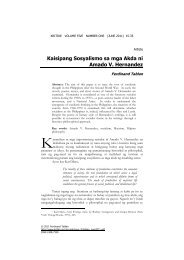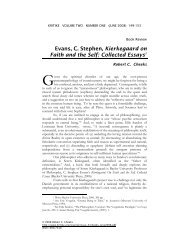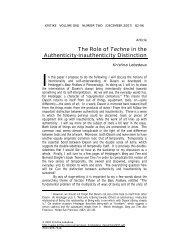Powell, Jason, Jacques Derrida - KRITIKE: An Online Journal of ...
Powell, Jason, Jacques Derrida - KRITIKE: An Online Journal of ...
Powell, Jason, Jacques Derrida - KRITIKE: An Online Journal of ...
Create successful ePaper yourself
Turn your PDF publications into a flip-book with our unique Google optimized e-Paper software.
<strong>KRITIKE</strong> VOLUME TWO NUMBER ONE (JUNE 2008) 145-148<br />
Book Review<br />
<strong>Powell</strong>, <strong>Jason</strong>,<br />
<strong>Jacques</strong> <strong>Derrida</strong>: A Biography 1<br />
Marko Zlomislic<br />
A<br />
s if it will ever be possible to write <strong>Derrida</strong>’s biography. Who would<br />
have the strength to settle the account and to take into account all the<br />
threads and themes and folds that will have taken place between what<br />
is announced as the date <strong>of</strong> <strong>Derrida</strong>’s birth and declared as the time <strong>of</strong> his<br />
death?<br />
<strong>Powell</strong> should be praised for making an excellent attempt that brings<br />
biographical material from other sources together in one volume. <strong>Powell</strong><br />
presents his account <strong>of</strong> <strong>Derrida</strong>’s life into periods: “Algeria,” “Paris and the<br />
ENS,” “The 1980’s,” and so on. He provides good summaries <strong>of</strong> <strong>Derrida</strong>’s<br />
major works with very good discussions <strong>of</strong> <strong>Derrida</strong>’s philosophical and literary<br />
sources.<br />
<strong>Powell</strong> states that he had no access to <strong>Derrida</strong>’s letters and personal<br />
papers. 2 This is understandable. However, given that he was writing a<br />
complete biographical overview, <strong>Powell</strong> could have consulted the <strong>Derrida</strong><br />
archive housed at the University <strong>of</strong> California, Irvine. 3 This material clearly<br />
shows the development <strong>of</strong> <strong>Derrida</strong>’s thought. It reveals that <strong>Derrida</strong> was a<br />
careful and meticulous researcher and scholar with a first rate understanding <strong>of</strong><br />
the history <strong>of</strong> philosophy. The archive also reveals <strong>Derrida</strong>’s lesser known<br />
sources such as Spinoza and Malebranche. Those who only consider <strong>Derrida</strong>’s<br />
published works do not have a proper context for understanding the full<br />
dimensions <strong>of</strong> <strong>Derrida</strong>’s project.<br />
<strong>Powell</strong> passionately defends <strong>Derrida</strong> from the attacks <strong>of</strong> critics and<br />
mis-readers such as John Searle and Roger Scruton. It is clear that he admires<br />
<strong>Derrida</strong> but in many places <strong>Powell</strong> relies on the interpretations <strong>of</strong> Bernasconi<br />
and Caputo. This reliance is problematic because it prevents <strong>Powell</strong> from<br />
getting to the heart <strong>of</strong> <strong>Derrida</strong>’s philosophy. I have located a few points <strong>of</strong><br />
contention that require a response.<br />
<strong>Powell</strong> refers to <strong>Derrida</strong>’s method as “basically Heideggerian<br />
deconstruction.” 4 Following Bernasconi, <strong>Powell</strong> believes that <strong>Derrida</strong> followed<br />
1 New York: Continuum Press, 2006. 250 pp.<br />
2 Ibid., 6.<br />
3 <strong>Jacques</strong> <strong>Derrida</strong>, Papers, MS-C01, Special Collections and Archives (The UC Irvine<br />
Libraries, Irvine, California).<br />
4 <strong>Powell</strong>, <strong>Jacques</strong> <strong>Derrida</strong>: A Biography, 1.<br />
© 2008 Marko Zlomislic<br />
http://www.kritike.org/journal/issue_3/zlomislic_june2008.pdf<br />
ISSN 1908-7330
146 JACQUES DERRIDA<br />
Levinas “in his ethics <strong>of</strong> the other.” 5 <strong>Powell</strong> speaks <strong>of</strong> “<strong>Derrida</strong>’s new<br />
Platonism.” 6 He believes that there is a continuity between Nietzsche and<br />
<strong>Derrida</strong>. 7 He claims that <strong>Derrida</strong>’s Glas, “has all the features <strong>of</strong> being the work<br />
<strong>of</strong> a beginner.” 8 <strong>Powell</strong> speaks <strong>of</strong> <strong>Derrida</strong>’s “belated study <strong>of</strong> Heidegger” and<br />
asks why <strong>Derrida</strong> waited until the late 1970’s and 1980’s to speak on<br />
Heidegger. 9 These mistakes need to be corrected.<br />
Simply put, in keeping with his aporetic turn, <strong>Derrida</strong>, as a first rate<br />
philosopher seeks to know the truth <strong>of</strong> the becoming <strong>of</strong> all things by<br />
deconstructing demonstrations, disseminating definitions, differancing<br />
distinctions and deciding over the abyss <strong>of</strong> undecidability. This method<br />
constitutes <strong>Derrida</strong>’s unique contribution to philosophical analysis.<br />
<strong>Derrida</strong> differs from Heidegger who stayed within the hermeneutic<br />
circle and fundamental ontology such that his philosophy remained closed to<br />
the possibility <strong>of</strong> responsibility, pure gift and decision. <strong>Derrida</strong> shows how<br />
ethical choice is made possible by the aporia <strong>of</strong> undecidability.<br />
<strong>Derrida</strong> differs from Plato who sought to suppress the pharmakon and<br />
its pharmaceutical excess. In refusing to see the undecidability <strong>of</strong> the<br />
pharmakon and what disseminates from it, Plato remained convinced <strong>of</strong> the<br />
purity <strong>of</strong> his philosophical operation even when the evidence indicated<br />
otherwise.<br />
While <strong>Derrida</strong> was influenced by Levinas there are essential differences<br />
in their philosophies. Levinas keeps the metaphysics <strong>of</strong> presence in the face<br />
that speaks. <strong>Derrida</strong> has difference and dissemination leading to a<br />
deconstruction <strong>of</strong> the metaphysics <strong>of</strong> presence. In Otherwise Than Being, Levinas<br />
focuses on the passivity that precedes choice. <strong>Derrida</strong> on the other hand,<br />
explores the choice that comes out <strong>of</strong> undecidability. In <strong>Derrida</strong>’s words from<br />
an interview entitled, “As if it were possible,” “I am simply trying to pursue<br />
with some consequence the thinking that for years has been engaged with the<br />
same aporias. The question <strong>of</strong> ethics, <strong>of</strong> rights and politics did not spring forth<br />
unexpectedly as from a bend in the road.” 10<br />
While <strong>Derrida</strong> can be said to belong to a Nietzschean lineage that<br />
argues for unlimited perspectives, he will be critical <strong>of</strong> Nietzsche for not<br />
getting beyond the “will to power” to a personal responsibility for decisions.<br />
<strong>Derrida</strong>’s Glas works out various models <strong>of</strong> glorification. This text can<br />
be seen as a masterpiece <strong>of</strong> philosophical analysis. <strong>Derrida</strong> develops his<br />
philosophy <strong>of</strong> glory as a pure giving with its ethics <strong>of</strong> responsibility to<br />
responsibility. In Glas <strong>Derrida</strong> meditates on the dialectical model <strong>of</strong><br />
glorification with Hegel, the inversion model <strong>of</strong> glory with Genet and develops<br />
5 Ibid., 104.<br />
6 Ibid., 84.<br />
7 Ibid., 8.<br />
8 Ibid., 113.<br />
9 Ibid., 184.<br />
10 <strong>Jacques</strong> <strong>Derrida</strong>, Negotiations: Interventions and Interviews, 1971-2001, ed. by Elizabeth<br />
N. Rottenberg (Stanford: Stanford University Press, 2002), 360.
M. ZLOMISLIC 147<br />
his own mourning model. To my mind, <strong>Derrida</strong> has a clear grasp <strong>of</strong> the<br />
philosophical, religious and literary tradition that he is exploring in Glas. It<br />
makes no sense to refer to this work as a beginner’s attempt.<br />
The archival material at Irvine indicates that <strong>Derrida</strong> was studying<br />
Heidegger as early as 1954. From 1961-1962 <strong>Derrida</strong> gave a seminar on<br />
Heidegger entitled, “Le Monde Chez Heidegger” From 1963-1964 he gave<br />
another seminar on Heidegger entitled ‘Erreur et Errance: Heidegger.’ One<br />
cannot claim comprehensiveness while ignoring material and information that<br />
was readily available.<br />
While <strong>Powell</strong> is correct to point out that <strong>Derrida</strong> was first “received by<br />
the American academic establishment as a literary writer.” 11 <strong>Derrida</strong> himself<br />
provides an explanation <strong>of</strong> his American reception. <strong>Derrida</strong> writes, “Literary<br />
theory, especially in America was more ready to listen to arguments and<br />
strategies to get behind reason’s back than institutional inscriptions <strong>of</strong><br />
philosophy . . . the politics <strong>of</strong> these departments . . . were in this sense more<br />
philosophical.” 12 While <strong>Powell</strong> does list the book from which <strong>Derrida</strong>’s words<br />
were taken in his Bibliography, he does not go far enough in allowing <strong>Derrida</strong><br />
to defend his own position. <strong>Powell</strong> misses many important quotes from<br />
<strong>Derrida</strong> that would have been his book comprehensive in scope and detail.<br />
Given that <strong>Derrida</strong> was accused by the analytic establishment <strong>of</strong><br />
destroying philosophy, <strong>Powell</strong> could have said more about <strong>Derrida</strong>’s passionate<br />
defense <strong>of</strong> philosophy. <strong>Derrida</strong> believed in “keeping the field <strong>of</strong> tradition<br />
open.” 13 Perhaps this is the reason the analytic tradition opposed <strong>Derrida</strong> who<br />
was against “a certain stabilizing or stabilized coding <strong>of</strong> hierarchy.” 14 Perhaps<br />
this is what <strong>Powell</strong> had in mind when he writes that analytic philosophy “has as<br />
its telos the establishment <strong>of</strong> a universal culture for a static, totalitarian<br />
universal civilization.” 15 I would have liked to see more analysis <strong>of</strong> this point<br />
and its relation to the attacks against <strong>Derrida</strong> from analytic philosophers who<br />
failed to take the advice <strong>of</strong> Wittgenstein when they wrote about things they did<br />
not fully read or understand.<br />
A separate history needs to be written here that would examine the<br />
continental/analytic divide. <strong>Powell</strong> begins this task by pointing out that<br />
<strong>Derrida</strong>’s “students and colleagues suffered the same treatment at the hands <strong>of</strong><br />
the establishment.” 16 I can attest to this mistreatment when I was prevented<br />
from completing my work on <strong>Derrida</strong>’s ethics and had to transfer to another<br />
institution. Other friends who were working on <strong>Derrida</strong> were subject to the<br />
same totalitarian tactics that <strong>Powell</strong> describes so well.<br />
Given that <strong>Powell</strong> has the word “biography” in the title <strong>of</strong> his book, I<br />
would have liked to see <strong>Powell</strong> say more about <strong>Derrida</strong>’s life and the man that<br />
he was. My own experience is that <strong>Derrida</strong> was a generous, kind man and a<br />
11 <strong>Powell</strong>, op cit., 98.<br />
12 <strong>Derrida</strong>, Negotations, 228.<br />
13 Ibid., 15.<br />
14 Ibid., 14.<br />
15 <strong>Powell</strong>, op cit., 124-125.<br />
16 Ibid., 144.
148 JACQUES DERRIDA<br />
decent human being. Attending his seminar in Paris in 1992 was a<br />
transformative and life changing experience. He responded to my letters and<br />
questions with hand written pages that I will always cherish. He encouraged<br />
my work with the wisdom <strong>of</strong> a dedicated teacher. He met with me when I was<br />
writing my introductions to the Croatian translations <strong>of</strong> The Other Heading and<br />
Specters <strong>of</strong> Marx. Reading <strong>Powell</strong>’s book was a worthwhile experience that has<br />
brought back many memories. The <strong>Derrida</strong> I remember does not resemble the<br />
picture chosen for the cover <strong>of</strong> <strong>Powell</strong>’s book. This fills me with sadness. I<br />
recommend this book to anyone beginning to read <strong>Derrida</strong> and to those who<br />
continue to read him.<br />
I would hope that someone will attempt to write about the man and<br />
his life rather than his works in a way that avoids the calculation that cancels<br />
out the future. <strong>Powell</strong> is correct in noting that such a work would exceed<br />
several volumes. This is the crisis and aporia <strong>of</strong> biography where one struggles<br />
to archive a legacy while retaining the secret <strong>of</strong> an undecidable reserve.<br />
References<br />
Liberal and Media Studies,<br />
Conestoga College Institute <strong>of</strong> Technology and Advanced Learning, Canada<br />
<strong>Derrida</strong>, <strong>Jacques</strong>, Negotiations: Interventions and Interviews, 1971-2001, ed. by<br />
Elizabeth N . Rottenberg (Stanford: Stanford University Press, 2002).<br />
<strong>Derrida</strong>, <strong>Jacques</strong>, Papers, MS-C01, Special Collections and Archives (The UC<br />
Irvine Libraries, Irvine, California).<br />
<strong>Powell</strong>, <strong>Jason</strong>, <strong>Jacques</strong> <strong>Derrida</strong>: A Biography (New York: Continuum Press, 2006).

















